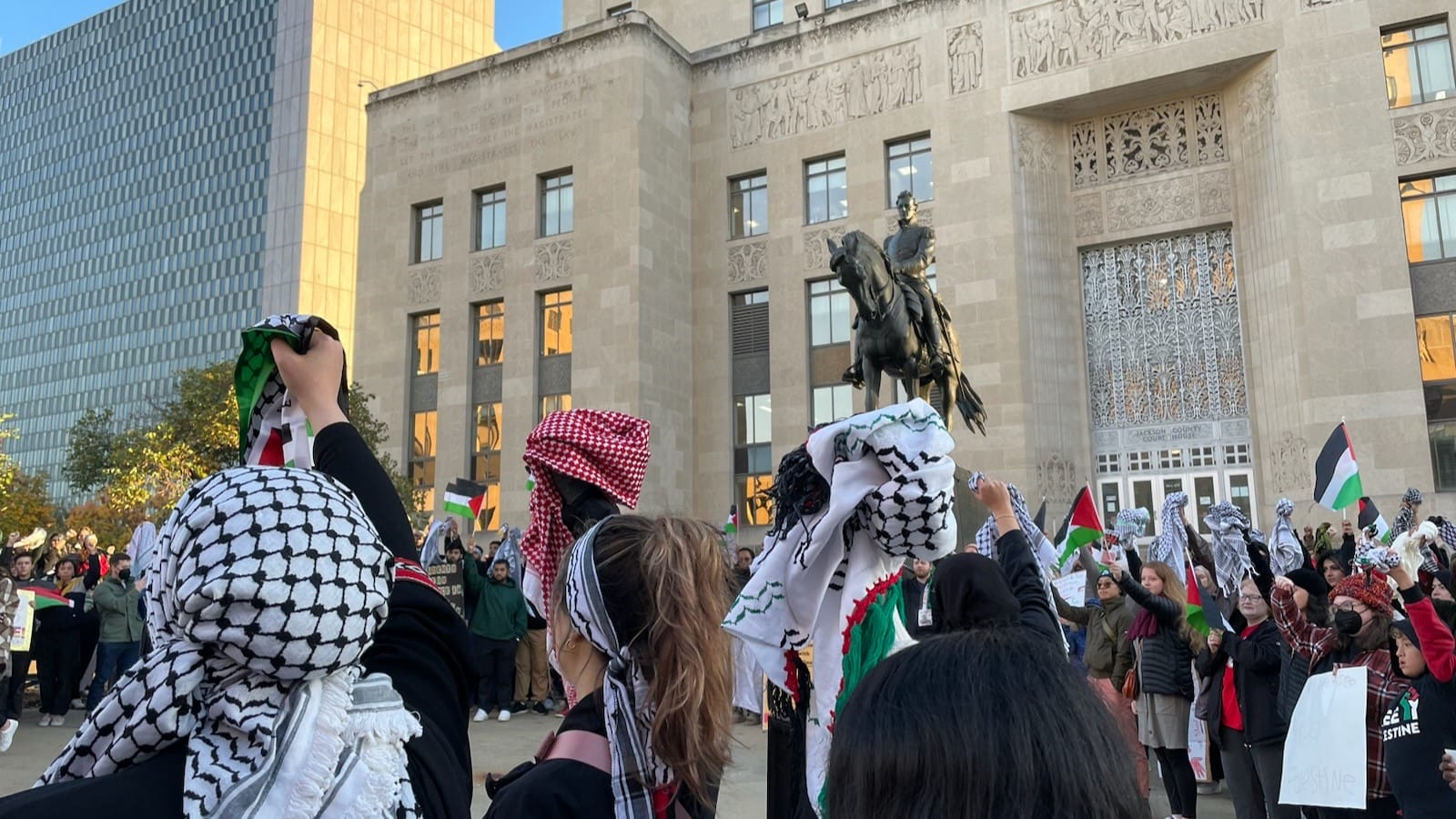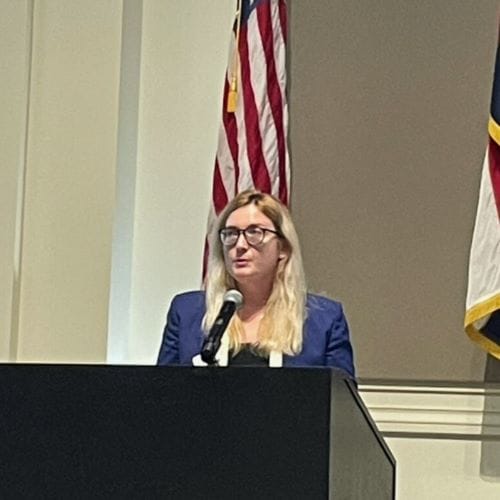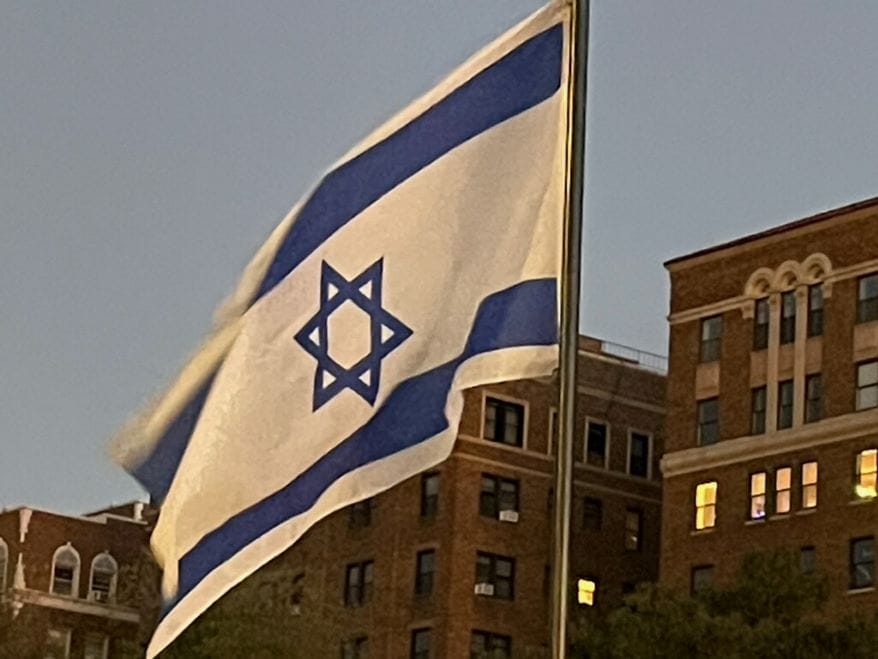KC’s Support for Israel Built on Defining Antisemitism Actions Predate Recent Conflict in the Middle East
Published October 31st, 2023 at 6:00 AM
Above image credit: Local elected and civic officials stood for photos at the conclusion of an update on Israel held in the boardroom of the Greater Kansas City Chamber of Commerce. Former American Jewish Committee CEO and noted expert on Israel David Harris addressed the group. (Mary Sanchez | Flatland)“Kansas City Stands with Israel.”
The message was projected on two large screens as a who’s who of elected and civic officials gathered in the spacious boardroom of the Greater Kansas City Chamber of Commerce in Union Station for a briefing on Israel.
The event last month is just one example.
When asked to do so, the metropolitan area’s most recognizable leaders have repeatedly stood with Israel following the bloodshed in Israel on Oct. 7.
Many have decried Hamas as a terrorist organization. And they haven’t wavered, despite more recent criticism of those stands.
Kansas City Mayor Quinton Lucas was among the speakers at the Oct. 12 Union Station event.
“You can disagree with the politics of Israel, or America… But to support, to rationalize and justify the barbaric murder of Jews is antisemitism,” Lucas said. “And we can say that clearly, strongly, proudly and bravely.”
Kansas City area leaders’ sense of solidarity with Israel has been years in the making.
It is the product of advocacy that predates the recent outbreak of war, the huge loss of life and the ongoing humanitarian crisis in Gaza.
In recent days, some pushback has begun.
A long list of local elected officials, including Lucas, have been called out during rallies in support of Palestinians in Gaza.
Protesters note area leaders’ vows to stand with Israel while offering little if any empathy for Palestinians — if they get mentioned at all.
Speakers at a rally outside of the Jackson County Courthouse on Friday afternoon criticized U.S. Sen. Josh Hawley.
The day prior, Hawley passed a resolution that condemned Hamas and labeled some university campus protests as antisemitic.
Many of the recent rallies in support of Palestinians have been organized by Al-Hadaf KC, which was organized about five years ago.
In a statement, the group said that not a single elected official in the metropolitan area has given the public “an objective, unbiased statement.”
“To the contrary, most have made very harmful statements against the Palestinian people and their basic human rights,” Al-Hadaf KC said.

Defining Antisemitism
Differentiating between antisemitic rhetoric and political criticism, especially the policies of Israel, has long been a focus of Jewish leadership, both globally and locally.
Kansas City’s Jewish community has long worked on programming to counter antisemitism and to forge support and connections with others.
But efforts have stepped up in the past two years, in part, due to rising numbers of incidents domestically and abroad targeting Jewish people.
A heavy focus has been on convincing local governments to pass resolutions noting the proliferation of antisemitism and to adopt the International Holocaust Remembrance Alliance’s (IHRA) Working Definition of Antisemitism.
Nearly a dozen cities and counties, along with the Kansas Legislature, have done so.
Those responses, along with the more recent stands with Israel, have been deeply appreciated by Gavriela Geller, executive director of the JCRB/AJC-Kansas City, which stands for Jewish Community Relations Bureau/American Jewish Committee, based in Overland Park.
“Your moral clarity and solidarity at this time means more than we could ever say,” she told the dozens of elected officials and other civic leaders who attended the Oct. 12 Union Station gathering.
The JCRB/AJC is chronicling local statements of support.

Calling the attack by Hamas on Oct. 7 “an unspeakable massacre of Jews,” Geller said, “It was the day in which the single largest number of Jews were murdered since the Holocaust. It was our worst nightmare, come true.”
Defining antisemitism is a first step in recognizing it, Geller said.
The IHRA definition is “a certain perception of Jews, which may be expressed as hatred toward Jews. Rhetorical and physical manifestations of antisemitism are directed toward Jewish or non-Jewish individuals and/or their property, toward Jewish community institutions and religious facilities.”
The language is not legally binding and was first developed more than a decade ago, with help from the American Jewish Committee.
The U.S. adopted the language in a 2019 executive order signed by then-President Donald Trump.
So far, eight Johnson County cities have done so: Fairway, Mission, Leawood, Prairie Village, Overland Park, Westwood Hills, Roeland Park and Olathe.
Those municipalities followed the adoption by the Kansas Legislature. The Johnson County Board of County Commissioners also supported the definition.
In January, the Kansas City Council adopted the definition through a resolution, by a 12-0 vote. Elsewhere on the Missouri side of state line, North Kansas City also approved the wording.
There’s been little debate.
Roeland Park was one of the few local cities that didn’t approve the resolution unanimously (6-2).
Some elected officials in Roeland Park questioned whether free speech would be protected and if it would silence political debate.
Geller argues the answer is “no.”
And what she’s long stressed might be a surprise to some.
Criticism of Israel is not antisemitic.
But it can be, especially when people conflate terms and hold Jews “collectively responsible” for the actions of Israel.
A YouTube video produced in 2021 by Geller and her colleague at JCRB, Sarah Markowitz, dives deeper into explanations.
Speakers during Roeland Park’s discussion of the resolution included Jewish residents who said they were highly critical of the Israeli government but supported passing the definition to differentiate between such scrutiny and antisemitism.
The current relevance of such distinctions is obvious. And it is difficult, if not impossible, to capture the nuanced views of many local residents, including the Arab-American population.
The surprise attack by Hamas in early October killed more than 1,400 Israelis, mostly civilians, including women and children. Nearly 200 hostages were taken.
Retaliatory bombings by Israeli forces have killed more than 7,700 people in Gaza, according to figures released by the United Nations.
Children’s Fund UNICEF has reported that nearly 2,400 children in Gaza are among the dead.
The U.N. is among those pleading for a ceasefire, fearing the unfolding humanitarian crisis as people in Gaza are cut off from fresh water, electricity and fuel to keep the few hospitals still in operation open.
The JCRB has long emphasized its belief that the security of the U.S. is tied to Israel and also supports “a negotiated two-state solution to the Israeli/Palestinian conflict that would allow both peoples to live in safety and dignity.”
Local Support for Palestinians
That more neutral stand might be one reason the local support is steady, even as local Arab Americans step forward with protests and rallies in recent weeks, advocating for the rights of Palestinians.
By comparison, there have been no broad public displays of support for Kansas City area Arab Americans by civic or elected officials.
It’s a void many say they feel, but they aren’t surprised.
A sense of being out-lobbied, out-funded and under-supported in American society is a norm for many Arab Americans.
Mahi Shilbaya lives in North Kansas City and is Jordanian. Her husband is Palestinian.
Together, they helped organize an Oct. 24 rally across the street from the Charles Evans Whittaker U.S. Courthouse downtown.
U.S. tax dollars shouldn’t fund Israeli displacement of Palestinians, much less support the bombings that are killing people in Gaza, she said.
“Not one dollar, not one dime,” she chanted to the several dozen people gathered. “Free, free Palestine.”

Area members of Congress were also called out for their support of Israel.
The support of U.S. Rep. and former Kansas City Mayor Emanuel Cleaver, Lucas and the Urban League of Greater Kansas City, draws special notice for some.
Each has been criticized for being Black leaders with civil rights track records, a standing that some feel is incongruent with support for Israeli’s retaliatory attacks in Gaza and the treatment of Palestinians for decades.
A long essay appeared last month in The Kansas City Defender, authored by its staff.
Two quotes from the piece:
“In these times, more than ever, our struggles are interconnected, laced together in a web of globalized oppression.”
“For Black leaders in Kansas City to stand against an oppressed people’s liberation elsewhere is to stand against it here.”
U.S. government spending that goes to Israel is another point of contention.
Feras El-Ghussein has spoken at several local rallies in support of the Palestinian people. He is a Palestinian American who was born in Gaza.
He has also emailed elected officials and didn’t receive a response.
“I swear to you we will not forget come election season,” he told the crowd Friday outside the Jackson County Courthouse. “We demand that our government be just.”
One of the chants at local rallies has been “from Ferguson to Palestine, killing children is a crime.”
Johnson County sites have also drawn people protesting for the rights of Palestinians.
The largest rally drew hundreds to Mill Creek near the Country Club Plaza on Oct. 14.
Many who have been attending are desperately trying to stay in contact with relatives in Gaza, fearing for their lives.
But generally, among elected and civic leadership, connections with the area’s Jewish community are more readily apparent.
Johnson County Commission Chair Mike Kelly has noted that his 3-year-old son attends play sessions at the Jewish Community Center Campus, a fact he uses to underscore the idea that the safety of the area’s Jewish community is linked to everyone’s.
The White House was lit up with blue and white lights after the attacks on Oct.7.
And so have been buildings in Johnson County, Kelly noted.
Clearly, longstanding civic ties exist with the 22,100 Jewish residents of the metropolitan area.
Among other factors, it’s also guided by decades of Jewish activism and financial support for area civil rights organizations.
Many have recently referenced when nearly 10 years ago, three local residents — a Catholic mother and wife, a United Methodist grandfather and his 14-year-old grandson — were murdered by a former Klansman and white supremacist who drove to the Jewish Community Center campus in Overland Park looking to shoot and kill Jewish people.
Such murderous hatred is easily condemned. As are acts like scrawling swastikas in public spaces.
It’s more difficult to decipher when discussions of Middle East politics drift into antisemitic rhetoric.
According to the American Jewish Committee, the International Holocaust Remembrance Alliance’s (IHRA) Working Definition of Antisemitism was intended as “a clear and compact description of antisemitism in its various forms, including Holocaust denial, prejudices against Jews, and the denial of Israel’s right to exist.”
Mary Sanchez is senior reporter for Kansas City PBS/Flatland.


